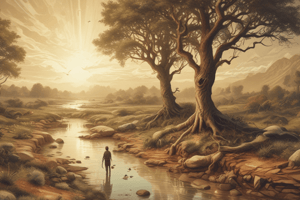Podcast
Questions and Answers
What is the basic conflict of the 'School Age' stage in Erik Erikson's Psychosocial Stages?
What is the basic conflict of the 'School Age' stage in Erik Erikson's Psychosocial Stages?
- Trust vs Mistrust
- Identity vs Confusion
- Industry vs Inferiority (correct)
- Autonomy vs Shame/Doubt
- Initiative vs Guilt
What virtue is developed during the 'Early Adulthood' stage in Erik Erikson's Psychosocial Stages?
What virtue is developed during the 'Early Adulthood' stage in Erik Erikson's Psychosocial Stages?
- Competence
- Love (correct)
- Will
- Hope
- Purpose
What is the basic conflict of the 'Play Age' stage according to Erik Erikson?
What is the basic conflict of the 'Play Age' stage according to Erik Erikson?
- Industry vs Inferiority
- Initiative vs Guilt (correct)
- Autonomy vs Shame/Doubt
- Trust vs Mistrust
- Identity vs Confusion
Which of the following is NOT a virtue developed in Erik Erikson's Psychosocial Stages?
Which of the following is NOT a virtue developed in Erik Erikson's Psychosocial Stages?
What is the basic conflict of the 'Early Childhood' stage in Erik Erikson's Psychosocial Stages?
What is the basic conflict of the 'Early Childhood' stage in Erik Erikson's Psychosocial Stages?
What is the basic conflict of the 'Infancy' stage according to Erik Erikson's theory?
What is the basic conflict of the 'Infancy' stage according to Erik Erikson's theory?
What is the main virtue developed in "Play Age" stage according to Erik Erikson?
What is the main virtue developed in "Play Age" stage according to Erik Erikson?
Which stage of Erik Erikson's Psychosocial Stages involves developing self-confidence in abilities?
Which stage of Erik Erikson's Psychosocial Stages involves developing self-confidence in abilities?
Flashcards
Trust vs. Mistrust
Trust vs. Mistrust
The first stage of Erikson's psychosocial development, occurring during infancy (0-1 year), where the infant learns to trust others based on whether their basic needs are consistently met. If needs are not met consistently, the infant may develop mistrust.
Autonomy vs. Shame/Doubt
Autonomy vs. Shame/Doubt
The second stage of Erikson's theory, happening during early childhood (2-3 years), where the child begins to develop a sense of independence and self-control. If they are encouraged to explore and make choices, autonomy flourishes. Excessive control or criticism can lead to shame and doubt.
Initiative vs. Guilt
Initiative vs. Guilt
The third stage of Erikson's theory, during play age (3-6 years), where children explore their surroundings and take initiative. If they are praised for their efforts and allowed to experiment, they develop a sense of purpose. Overly controlling parents or punishments can lead to guilt.
Industry vs. Inferiority
Industry vs. Inferiority
Signup and view all the flashcards
Identity vs. Confusion
Identity vs. Confusion
Signup and view all the flashcards
Intimacy vs. Isolation
Intimacy vs. Isolation
Signup and view all the flashcards
Ego Identity
Ego Identity
Signup and view all the flashcards
Moratorium
Moratorium
Signup and view all the flashcards
Diffusion
Diffusion
Signup and view all the flashcards
Foreclosure
Foreclosure
Signup and view all the flashcards
Political Socialization
Political Socialization
Signup and view all the flashcards
Collective Identity
Collective Identity
Signup and view all the flashcards
Political Culture
Political Culture
Signup and view all the flashcards
Elite Culture
Elite Culture
Signup and view all the flashcards
Mass Culture
Mass Culture
Signup and view all the flashcards
Minority Cultures
Minority Cultures
Signup and view all the flashcards
Study Notes
Erikson's Psychosocial Stages
-
Infancy (0-18 months):
- Basic conflict: Trust vs. Mistrust
- Virtue: Hope
- Description: Developing a sense of trust in others and the world, or mistrust, based on early experiences.
-
Early Childhood (2-3 years):
- Basic conflict: Autonomy vs. Shame and Doubt
- Virtue: Will
- Description: Developing independence and self-assurance, or feelings of shame and doubt.
-
Play Age (3-5 years):
- Basic conflict: Initiative vs. Guilt
- Virtue: Purpose
- Description: Taking initiative and exploring, or developing guilt when unsuccessful or boundaries are overstepped.
-
School Age (6-12 years):
- Basic conflict: Industry vs. Inferiority
- Virtue: Competence
- Description: Developing self-confidence in skills and abilities, or feeling inferior when not competent.
-
Adolescence (12-18 years):
- Basic conflict: Identity vs. Role Confusion
- Virtue: Fidelity
- Description: Experimenting with different roles and values to develop a sense of self and identity, or feeling confused and unsure about one's place in the world.
-
Early Adulthood (19-29 years):
- Basic conflict: Intimacy vs. Isolation
- Virtue: Love
- Description: Developing close relationships with others, or feeling isolated and alone.
Studying That Suits You
Use AI to generate personalized quizzes and flashcards to suit your learning preferences.




